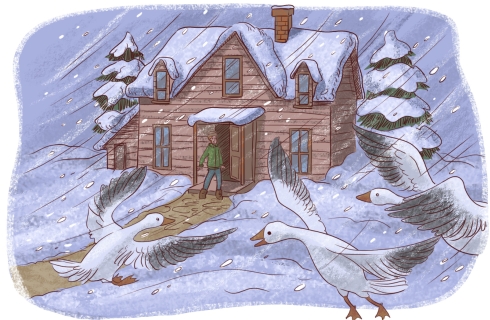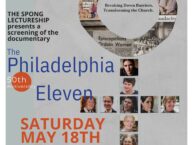 December 27, 2015: May God’s words alone be spoken, may God’s words alone be heard. Amen.
December 27, 2015: May God’s words alone be spoken, may God’s words alone be heard. Amen.
Well, you made it! All over the stores and Facebook, it would seem that Christmas is over. The stores have “after Christmas” sales on, and have started putting out Valentine’s Day displays. Everything can go back to normal – to the way it was. Some Christmas trees have been dragged to the curb, lights have come down (or have been turned off), and relatives are heading home (or some hope they are). And folks are posting things on social media giving thanks that Christmas is finally over!
I hate to break it to them, but Christmas isn’t over – not by a long shot.
Not only does the church celebrate Christmas for twelve days ending on the feast of the Epiphany on January 6th, but some even consider Christmastide to go on until after Candlemas on February 2nd! So, not over. Not at all. In fact, we are just getting started! Those kings haven’t arrived yet, but if you are looking for them – they are here somewhere making their long journey toward the creche. And that in itself is symbolic of our faith.
The Christmas story takes a journey to really know it. That is why being here in the weeks to come is so important for understanding what this birth in a manger is really all about.
Part of that journey is today’s passage from the Gospel of John. It is the familar prolog – an ancient hymn scholars say – and there’s a whole lot of light going on in it, right? “What has come into being in him was life, and the life was the light of all people. The light shines in the darkness, and the darkness did not overcome it.” John was not the light, but called attention to the light… Part of it was read on Christmas Eve as a young person brought forward a candle from the baptismal font in the darkened church from which we all lit our candles. It was a beautiful moment – and it symbolized everything we are hearing in scripture today – the light of God, in the form of Jesus – coming into the world – becoming flesh and dwelling among us.
Why would God do that, and why is light so much a part of understanding who Jesus was and is?
If we start with the first question, the incarnation we can understand the second. Why would God become human? Many get stuck in their journey right there. I know I did at one time. And the early church did as well.
See, one of the things that is hard to wrap our heads around is the incarnational part of our faith. That stuff in the creed we might say with our fingers crossed behind our backs, “God from God, Light from Light.. True God from True God.” We get that God loves us (or maybe we are trying to get it). We love the Christmas story – that Jesus was born in a humble place to Mary and Joseph – and this idea of Jesus not being born, but existing for all time conflicts with that imagery. And, many would say that it is enough that Jesus taught us how to live in relationship with God, and I totally understand this point of view. For some others, it is just this type of incarnational talk that makes them think that the whole story is a big myth (as though myth has no truth to it – but, that’s a sermon for another day). But this gospel, written much later, and even controversial for exactly this non-human emphasis on the nature of Jesus, is telling us something so profound that to brush it aside is to lose the real meaning of Christmas – and no, it has nothing to do with snowflakes on red Starbucks coffee cups!
I am reminded of a story. “Once long ago, there was a man who didn’t believe in God. When his wife and children left for the Christmas Pageant at church one snowy Christmas Eve, he shook his head and muttered. “That story is complete nonsense! Why would God bother to come to Earth as a lowly human? It’s ridiculous!” Shortly after his family had left, the winds grew stronger and the snowfall turned into a first-class blizzard. As the man gazed out the window, all he could see was swirling snow. His wife called to say they had made it safely to the church, but they might be delayed coming back; so, he put more logs on the fire and settled down to enjoy the evening with a good book.
But then he heard a loud thump. Something had hit the window. And then he heard another. He went outside to see what could have been making the sounds. In the field near his house, was a flock of wild geese. Apparently they’d been flying south for the winter when they got caught in the snowstorm and couldn’t go on. They were lost and stranded, with no food or shelter. They just flapped their wings and flew around the field in low circles, blindly and aimlessly. Several of them had flown into his window and were injured.. The man felt sorry for the geese and wanted to help them. He had a warm barn that would make a safe refuge for them until the storm passed. So he walked out to the barn and opened the doors wide – hoping they’d notice and fly inside. But the geese just fluttered around and didn’t seem to see the barn at all.
The man tried to get their attention, but that just seemed to scare them and they moved further away. So he went and got some bread and made a trail of breadcrumbs leading to the barn, but the geese still didn’t catch on. Now he was getting frustrated.
He got behind them and tried to shoo the geese toward the barn, but they only got more scared and scattered in every direction except, of course, toward the barn. Nothing he did could get them to go into the barn where they would be warm and safe. He was about to give up when he thought to himself – “If only I were a goose, then I could help them. They would understand what I was trying to do for them.”
And then he had an idea. He went into the barn and got one of his own geese. Once he was behind the flock of wild geese, he released his goose who immediately flew through the flock and straight into the barn – and one by one every one of the wild geese followed.
The man thought about what’d just happened. The geese needed another goose to save them – they could trust another goose – they could understand another goose – but not a human being. He thought back to his earlier remarks when his wife and children had left for church: “Why would God want to be like us? It’s ridiculous.” And suddenly it all made sense. We were like the geese – blind, lost, and stumbling around. So God became like us so that we could trust God, and understand just how much God loved us and wanted to help us. That was the meaning of Christmas! And the man was forever changed.”
This is why this passage from the Gospel of John is not only poetic, but speaks about something so profound it defies any attempt to box it into human ideas of the way things are. And strangely enough, if we really think about it, you don’t have to be a theologian to understand it either. All we need to think about is how much all of us want to be loved, safe, warm and cared for, and how much we want that for others too. We want to be in relationship with one another, and as we are created in the image of God, God wants that too.
But perhaps just as important is what we are to do with this relationship. Remember all that light imagery I mentioned earlier was in the passage from John? There’s a reason for that. Light represents so many things – warmth, the ability to see things that are hidden, and even hope. So, it is a great metaphor for the way God works, and for who Christ is – that no matter how dark, God’s love is the light that will cut through it, and will never be overcome. But there is more to it.
If you were here for the 5pm service on Christmas Eve, you got a two-fer. A sermon for the adults, but also a message for the children. One of the things I talked about with the children was how Jesus gave us a gift, and I showed them this box. I had them pull out what was inside one part at a time. The first item was the baby Jesus (now resting comfortably in his cradle in the Creche). The next item was this flashlight. That, I told them, represents the light of Christ. Jesus was God’s gift to us, and that gift is a light that will shine in the darkness, just like a flashlight. The last item was this mirror. And it is for this, most of all, that God wanted to dwell among us. I told the children that we were the mirror – reflecting the light of Christ to others. But there was something I left out.
It is one thing to accept God’s love, to experience the light of Christ in our lives. But, as the Johannian Community that wrote this gospel said in the prolog, God incarnate means far more than that for us. They write, “But to all who received him, who believed in his name, he gave power to become children of God, who were born, not of blood or of the will of the flesh or of the will of man, but of God.”
Now, we all know we were born of human parents, so what is the text saying exactly? It is proclaiming the good news of God in Christ is that each of us, through him…may be him. And St. Paul in our reading from Galatians is saying something similar, when he writes, “And because you are children, God has sent the Spirit of [Jesus] into our hearts…So you are no longer a slave but a child, and if a child then also an heir, through God.”
Both the authors of the Gospel, and St. Paul are saying we are to be the mirror…because we are the flashlight. If that sounds confusing, just listen to this snippet from our Collect today: “Grant that this light, enkindled in our hearts, may shine forth in our lives.”
All of what we have heard today speak of God touching us to set off a spark that would light the world. Jesus wasn’t the only one birthed that night…we were too! Makes the whole gift giving thing a bit more meaningful, doesn’t it? God loved us so much as to be one of us so that we may come to know that love in the fullest sense. We, as the body of Christ, the children and heirs of God, have the same work to do in the world that the one born to us at Christmas did.
The real meaning of the birth of Jesus, of the incarnation, is that we ourselves are born anew at Christmas. And the light of Christ incarnate in our hearts at Christmas, is to be taken into the darkness of the world that others might find their way home.
Jesus was and is both the flashlight and the mirror – being the child of God, and reflecting God’s love in his life that others might know God in a dark world.
We are both flashlight and mirror – being God’s child, and reflecting God’s love in our lives that others might know God in a dark world.
That is the miracle of the incarnation, and it isn’t all that complicated really.
Christmas doesn’t happen to us, it is us. It doesn’t happen once a year, or even for twelve days, but it happens every day, if we let Christ enter our hearts.
Christmas is about gifts – God’s gift to us and to the world.
A gift of love.
And it is a gift that we are expected to re-gift every day wrapped in the love we share with one another, and with the world, in the name of Christ.
Amen.
For the audio of the sermon from the 10:30am service, click here:
The Rev. Diana L. Wilcox
Christ Church in Bloomfield & Glen Ridge
December 27, 2015
Christmas II
1st Reading – Isaiah 61:10-62:3
Psalm 147:13-21
2nd Reading – Galatians 3:23-25; 4:4-7
Gospel – John 1:1-18






